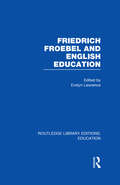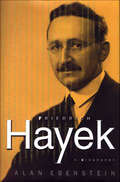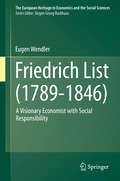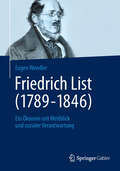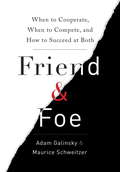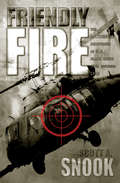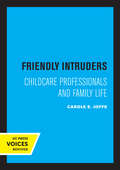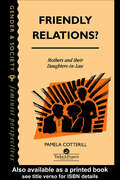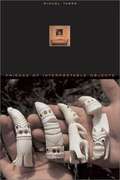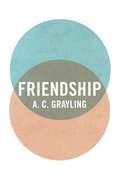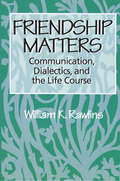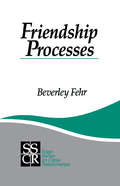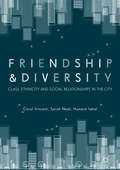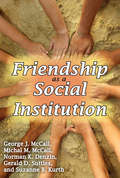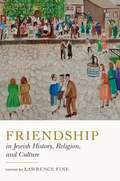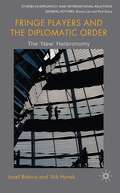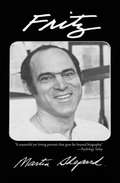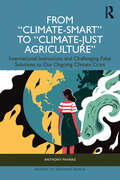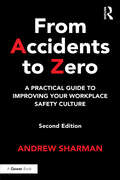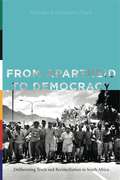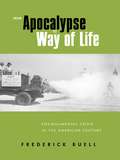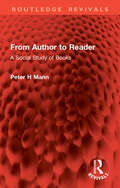- Table View
- List View
Friedrich Froebel and English Education (Routledge Library Editions: Education)
by Evelyn LawrenceThis collection of essays describes Froebel’s life and the history of his influence on the education of young children in Britain. It also traces the religious roots of his philosophy and discusses his psychological and educational principles in the light of developments in these fields since his day.
Friedrich Hayek: A Biography
by Alan EbensteinThis biography tells the story of one of the most important public figures of the twentieth century, Friedrich Hayek.Here is the first full biography of Friedrich Hayek, the Austrian economist who became, over the course of a remarkable career, the great philosopher of liberty in our time. In this richly detailed portrait, Alan Ebenstein chronicles the life, works, and legacy of a visionary thinker, from Hayek's early years as the scholarly son of a physician in fin-de-siecle Vienna on an increasingly wider world as an economist and political philosopher in London, New York, and Chicago.Ebenstein gives a balanced, integrated account of Hayek's extraordinary diverse body of work, from his fist encounter with the free market ideas of mentor Ludwig Von Mises to his magisterial writings in later life on the legal, political, ethical, and economic requirements of a free society. Awarded the Nobel Prize in 1974, Hayek's vision of a renewed classical liberalism-of free markets and free ideas in free societies-has taken hold in much of the world.Alan Ebenstein's clearly written account is an essential starting point for anyone seeking to understand why Hayek's ideas have become the guiding force of our time. His illuminating portrait of Hayek the man brings to new life the spirit of a great scholar and tenacious advocate who has become, in Peter Drucker's words, "our time's preeminent social philosopher."
Friedrich List (1789-1846)
by Eugen WendlerFriedrich List (1789-1846) was a prophet of social market economy, national economy and the infant-industry theory. In this comprehensive biography the international influence and reception of List's theories is presented together with his extraordinary vita List was a notable early advocate of economic integration of the many separate states of 19th century Germany. His basic theory is that of productive resources and the need to protect infant industries until they have matured enough to stand alone. He is recognized as a visionary economist with social responsibility and as an influential railway pioneer. He was a liberal and a democrat who promoted an extended representative democracy, including respect for human rights and civil liberties, to accompany industrial development His highly influential main work "The National System of Political Economy" has been translated into many languages. Eugen Wendler, the renowned author and List expert, not only builds upon his many years of research, but also discusses several new sources. This richly illustrated book is as informative as it is well written.
Friedrich List (1789-1846)
by Eugen WendlerIn dieser ebenso unterhaltsamen wie informativen Biografie wird die Wirkungs- und Rezeptionsgeschichte der Theorien von Friedrich List auf der Basis seines außergewöhnlichen Lebenslaufes dargestellt. Der renommierte und mehrfach für seine Forschung ausgezeichnete List-Experte Eugen Wendler fasst hier die Ergebnisse seiner langjährigen Forschungsarbeit zusammen und ergänzt sie durch neueste Erkenntnisse und Quellen. So ist ein umfassendes und werthaltiges Werk entstanden, das zudem zahlreiche bislang noch unbekannte Abbildungen enthält.
Friend & Foe: When to Cooperate, When to Compete, and How to Succeed at Both
by Adam Galinsky Maurice SchweitzerWhat does it take to succeed? This question has fueled a long-running debate. Some have argued that humans are fundamentally competitive, and that pursuing self-interest is the best way to get ahead. Others claim that humans are born to cooperate and that we are most successful when we collaborate with others. In FRIEND AND FOE, researchers Galinsky and Schweitzer explain why this debate misses the mark. Rather than being hardwired to compete or cooperate, we have evolved to do both. In every relationship, from co-workers to friends to spouses to siblings we are both friends and foes. It is only by learning how to strike the right balance between these two forces that we can improve our long-term relationships and get more of what we want.Here, Galinsky and Schweitzer draw on original, cutting edge research from their own labs and from across the social sciences as well as vivid real-world examples to show how to maximize success in work and in life by deftly navigating the tension between cooperation and competition. They offer insights and advice ranging from: how to gain power and keep it, how to build trust and repair trust once it's broken, how to diffuse workplace conflict and bias, how to find the right comparisons to motivate us and make us happier, and how to succeed in negotiations - ensuring that we achieve our own goals and satisfy those of our counterparts.Along the way, they pose and offer surprising answers to a number of perplexing puzzles: when does too much talent undermine success; why can acting less competently gain you status and authority, where do many gender differences in the workplace really come from, how can you use deception to build trust, and why do you want to go last on American Idol and in many interview situations, but make the first offer when negotiating the sale of a new car.We perform at our very best when we hold cooperation and competition in the right balance. This book is a guide for navigating our social and professional worlds by learning when to cooperate as a friend and when to compete as a foe--and how to be better at both.
Friendly Fire: The Accidental Shootdown of U.S. Black Hawks over Northern Iraq
by Scott A. SnookOn April 14, 1994, two U.S. Air Force F-15 fighters accidentally shot down two U.S. Army Black Hawk Helicopters over Northern Iraq, killing all twenty-six peacekeepers onboard. In response to this disaster the complete array of military and civilian investigative and judicial procedures ran their course. After almost two years of investigation with virtually unlimited resources, no culprit emerged, no bad guy showed himself, no smoking gun was found. This book attempts to make sense of this tragedy--a tragedy that on its surface makes no sense at all. With almost twenty years in uniform and a Ph.D. in organizational behavior, Lieutenant Colonel Snook writes from a unique perspective. A victim of friendly fire himself, he develops individual, group, organizational, and cross-level accounts of the accident and applies a rigorous analysis based on behavioral science theory to account for critical links in the causal chain of events. By explaining separate pieces of the puzzle, and analyzing each at a different level, the author removes much of the mystery surrounding the shootdown. Based on a grounded theory analysis, Snook offers a dynamic, cross-level mechanism he calls "practical drift"--the slow, steady uncoupling of practice from written procedure--to complete his explanation. His conclusion is disturbing. This accident happened because, or perhaps in spite of everyone behaving just the way we would expect them to behave, just the way theory would predict. The shootdown was a normal accident in a highly reliable organization.
Friendly Intruders: Childcare Professionals and Family Life
by Carole JoffeThe governments of many industrialized societies have developed extensive childcare facilities and services to meet the needs of young children and their working parents, but no such program on a national scale has yet evolve in the United Staes. Some who oppose federal aid or control believe that mothers should remain at home with their preschool children rather than turn them over to childcare professionals--the "friendly intruders" of the titels--and that any other policy is a threat to the moral climate and stability of family life. However, since the demand for childcare services is very great, and since Congress has previously passed relevant legislation (which was vetoed by President Nixon), the issue of childcare will surely rise again soon. In this study, based upon direct observation of a local childcare program in California, the author examines several pof the practical policy issues concerning childcare which have not yet been resolved. Who will control such programs in the future, public school systems or others? Which agencies or institutions will certify the competence of childcare personnel? To what extent will parents contribute to the content of the programs provided for their young children? A major part of Professor Joffe's study is concerned with the emerging professionalism of early childhood educators. In a pattern now understood to be classic, such persons seek status and recognition through education, certification, and membership in professional associations. However, what happens when parents and professional disagree about values, behavioral norms, and the educational content of a nursery school program? Who is the "expert" in such a confrontation? The author observed profoundly different orientations to childcare not only between professionals and parents, but also among different groups of parents, especially along racial and class lines; how can professionals accommodate such differences? The author's conclusions emerge from careful study of day-by-day encounters between staff, parents and supervisors, giving to her book a sense of immediacy and well-focused understanding that is rarely achieved in academic studies. Parents, educators and policy analysts concerned with the subject will find it indispensable. This title is part of UC Press's Voices Revived program, which commemorates University of California Press's mission to seek out and cultivate the brightest minds and give them voice, reach, and impact. Drawing on a backlist dating to 1893, Voices Revived makes high-quality, peer-reviewed scholarship accessible once again using print-on-demand technology. This title was originally published in 1977.
Friendly Relations?: Mothers And Their Daughters-In-Law
by Pamela CotterillPower relationships between men and women have been discussed extensively in feminist literature, but power relationships between women the significance of in-law relationships between women has largely been overlooked. There is very little positive imagery surrounding the role of the mother-in-law.; Why do myths about "interfering" mothers-in-law predominate? Why are mother-in-law relationships seen as fraught with conflict and not expected to go well? What gives rise to these ideas, how are they maintained and how do they effect family life?; "Friendly Relations?" examines the popular imagery expressed in mother-in-law jokes, and demonstrates how daughters-in-law come to hold the balance of power in the relationship and are able to control it in ways not available to mothers-in-law. The book explores how these relationships are supported and maintained within the context of private and public Notions Family Life. It Traces The Development Of The Relationship through the life-course, demonstrating the influence of significant events such as divorce, cohabitation, grandparenting, ageing and widowhood.; The book tackles areas of private life which are often Difficult To Talk About, And Negative Emotions Such As Jealousy And possessiveness. However, the author refutes the idea that the relationship is always fraught with tension and conflict and examines opportunities for friendship and support in affinal women.
Friends of Interpretable Objects
by Miguel TamenA strikingly original work, Friends of Interpretable Objects re-anchors aesthetics in the object of attention even as it redefines the practice, processes, meaning, and uses of interpretation. Miguel Tamen's concern is to show how inanimate objects take on life through their interpretation--notably, in our own culture, as they are collected and housed in museums. It is his claim that an object becomes interpretable only in the context of a "society of friends." Thus, Tamen suggests, our inveterate tendency as human beings to interpret the phenomenal world gives objects not only a life but also a society. As his work unfolds, "friends" also takes on a legal sense, as advocates, introduced to advance the argument that the social life of interpreted and interpretable objects engenders a related web of social obligations. Focusing on those who, through interpretation, make objects "speak" in settings as different as churches, museums, forests, and distant galaxies--those who know the best interests of corporations, endangered species, and works of art--Tamen exposes the common ground shared by art criticism, political science, tort law, and science. Learned and witty, with much to teach art historians, environmentalists, anthropologists, curators, and literary critics, his book utterly reorients our understanding of how we make sense of our world.
Friendship
by A. C. GraylingA central bond, a cherished value, a unique relationship, a profound human need, a type of love. What is the nature of friendship, and what is its significance in our lives? How has friendship changed since the ancient Greeks began to analyze it, and how has modern technology altered its very definition? In this fascinating exploration of friendship through the ages, one of the most thought-provoking philosophers of our time tracks historical ideas of friendship, gathers a diversity of friendship stories from the annals of myth and literature, and provides unexpected insights into our friends, ourselves, and the role of friendships in an ethical life. A. C. Grayling roves the rich traditions of friendship in literature, culture, art, and philosophy, bringing into his discussion familiar pairs as well as unfamiliar--Achilles and Patroclus, David and Jonathan, Coleridge and Wordsworth, Huck Finn and Jim. Grayling lays out major philosophical interpretations of friendship, then offers his own take, drawing on personal experiences and an acute awareness of vast cultural shifts that have occurred. With penetrating insight he addresses internet-based friendship, contemporary mixed gender friendships, how friendships may supersede family relationships, ones duty within friendship, the idea of friendship to humanity, and many other topics of universal interest.
Friendship Matters: Communication, Dialectics, And The Life Course
by William RawlinsIn this volume, Dr. Rawlins traces and investigates the varieties, tensions, and functions of friendship for males and females throughout the life course. Using both conceptual and illustrative chapters, the book portrays the degrees of involvement, choice, risk, ambivalence, and ambiguity within friendships, and explores the emotional texture of interactions among friends. A concluding section examines the prospects for friendship in the course of our post-modern blurring of public and private domains and discursive sites.
Friendship Processes
by Beverley FehrThis broad-ranging volume examines how friends give meaning to our lives. Each phase of the friendship process is illustrated with empirical research. The result is a conceptual framework that illuminates the fascinating components involved in making friends, becoming close and keeping friends, and in friendships deteriorating and dissolving.
Friendship and Diversity: Class, Ethnicity And Social Relationships In The City
by Carol Vincent Sarah Neal Humera IqbalDo people make friends with those who are culturally and socially different to themselves? Friendship and Diversity explores the social relationships of adults and children living in highly diverse localities in London. The authors examine how social class and ethnic difference affects the friendships of children in primary schools and their parents. The book draws on original and in-depth conversations 8 and 9 year olds about their classroom relationships, with parents about their own and their children’s friendships, and with teachers about supporting children’s friendships at school. Through detailed discussions of friendships, everyday multiculture, and attitudes towards shared social space, cultural difference and social class, the authors reveal what these friendships tell us about the nature and extent of social mixing and social divisions in cities with diverse populations. Friendship and Diversity will be of interest to students and scholars across a range of disciplines, including sociology, geography and psychology, as well as education practitioners.
Friendship as a Social Institution
by Michal McCallWhat is the social organization of love, friendship, rivalry, marriage, admiration, collegiality, parenthood, acquaintance, and clientage? How are these types of relationships similar and how do they differ? Few sociological works exist on relationships between friends, business partners, customers and clerks, mailmen and homeowners, and employers and employees, as social rather than role relationships. This classic book remains of interest because it focuses on voluntary personal relationships relationships that people need not enter, whose content is up to the participants, whose rules are what the participants agree they will be.The authors create an analytic framework within which to describe and compare the enormous range of relationships between two persons. They detail the shape and structure of such relationships, consider their organizational dynamics, their range and the nature of deviance in them, and point out analytical variables and dimensions upon which relationships can be located for comparative purposes. Organizational change in terms of how relationships are formed, developed, and transformed is covered, as is their function and dysfunction for the individual and society.By regarding social relationships consistently from the viewpoint of social organization theory, the book assimilates them to sociological concepts in general, but with an eye to the social psychological and organizational features that render them distinctive as a type. Friendship as a Social Institution sustains the study of friendship by making distinctions and outlining the problems connected with the study of social relationships.
Friendship in Jewish History, Religion, and Culture (Dimyonot #12)
by Lawrence FineThe ubiquity of friendship in human culture contributes to the fallacy that ideas about friendship have not changed and remained consistent throughout history. It is only when we begin to inquire into the nature and significance of the concept in specific contexts that we discover how complex it truly is. Covering the vast expanse of Jewish tradition, from ancient Israel to the twenty-first century, this collection of essays traces the history of the beliefs, rituals, and social practices surrounding friendship in Jewish life.Employing diverse methodological approaches, this volume explores the particulars of the many varied forms that friendship has taken in the different regions where Jews have lived, including the ancient Near East, the Greco-Roman world, Europe, and the United Sates. The four sections—friendship between men, friendship between women, challenges to friendship, and friendships that cross boundaries, especially between Jews and Christians, or men and women—represent and exemplify universal themes and questions about human interrelationships. This pathbreaking and timely study will inspire further research and provide the groundwork for future explorations of the topic.In addition to the editor, the contributors are Martha Ackelsberg, Michela Andreatta, Joseph Davis, Glenn Dynner, Eitan P. Fishbane, Susannah Heschel, Daniel Jütte, Eyal Levinson, Saul M. Olyan, George Savran, and Hava Tirosh-Samuelson.
Friendship in Jewish History, Religion, and Culture (Dimyonot: Jews and the Cultural Imagination #12)
by Lawrence FineThe ubiquity of friendship in human culture contributes to the fallacy that ideas about friendship have not changed and remained consistent throughout history. It is only when we begin to inquire into the nature and significance of the concept in specific contexts that we discover how complex it truly is. Covering the vast expanse of Jewish tradition, from ancient Israel to the twenty-first century, this collection of essays traces the history of the beliefs, rituals, and social practices surrounding friendship in Jewish life.Employing diverse methodological approaches, this volume explores the particulars of the many varied forms that friendship has taken in the different regions where Jews have lived, including the ancient Near East, the Greco-Roman world, Europe, and the United Sates. The four sections—friendship between men, friendship between women, challenges to friendship, and friendships that cross boundaries, especially between Jews and Christians, or men and women—represent and exemplify universal themes and questions about human interrelationships. This pathbreaking and timely study will inspire further research and provide the groundwork for future explorations of the topic.In addition to the editor, the contributors are Martha Ackelsberg, Michela Andreatta, Joseph Davis, Glenn Dynner, Eitan P. Fishbane, Susannah Heschel, Daniel Jütte, Eyal Levinson, Saul M. Olyan, George Savran, and Hava Tirosh-Samuelson.
Fringe Players And The Diplomatic Order
by Jozef Bátora Nik HynekThis book analyzes ways how three fringe players of the modern diplomatic order - the Holy See, the Sovereign Military Order of Malta, and the EU have been accommodated within that order, revealing that the modern diplomatic order is less state-centric than conventionally assumed and is instead better conceived of as a heteronomy. "
Fritz
by Martin ShepardFritz Perls described himself as a &“mediocre psychoanalyst&” who became &“the possible creator of a &‘new&’ method of treatment&”—Gestalt Therapy. His wife described him as half prophet, half bum. Dave Rybeck, reviewing FRITZ in Psychology Today, said that &“Martin Shepard has done an excellent job of getting into, on top of, and under the Fritz Perls mystique. He spent two years learning all he could about Perls&’s life and has produced a masterful yet loving portrait that goes far beyond biography. FRITZ offers a Fritz Perls to whom few, if any, were privy. This holistic view of Fritz, his early falterings, his neurotic rootlessness, his prima donna pettiness, his chronic self-doubts and, above all, his driving destiny to become a great master in the world of psychotherapy, reveals a human, lovable person. It leaves me feeling glad that Fritz did his thing. And that Martin Shepard did his, too.&”
From "Climate-Smart" to "Climate-Just Agriculture”: International Institutions and Challenging False Solutions to our Ongoing Climate Crisis (Bridges to Another World)
by Anthony PahnkeCombining innovative social theory with ongoing policy discussions on climate change, this book analyzes past and present efforts at challenging global poverty through reforming the dynamics of worldwide agricultural production.Focusing on the efforts of the World Bank and CGIAR research centers, particularly through research and projects that have been launched by the International Maize and Wheat Improvement Center (CIMMYT) and the International Food Policy Research Institute (IFPRI), “Climate-Smart” to “Climate-Just” exposes how neoliberal principles of limited government and individual entrepreneurship have expanded through the development of “Climate-Smart Agriculture.” At the same, an alternative – “Climate-Just Agriculture” – is becoming possible as rightwing populists have disrupted international free trade orthodoxy, and social movement demands for food sovereignty gain traction in key international spaces.As Pahnke explains in this innovative account, “Climate-Just Agriculture” includes structural changes to free trade agreements that would build from local and regional food systems to make them resilient in the face of the adverse effects of climate change. This resiliency, moreover, allows marginalized groups the capacity to create and participate in markets that allow for greater self-sufficiency to push back on colonialism and imperialism.Written in a clear and accessible style, this book will be essential reading for students and scholars of sociology, environmental studies, and politics, as well as for policymakers and professionals involved in climate change policy and the agriculture and food industry.
From Accidents to Zero: A Practical Guide to Improving Your Workplace Safety Culture
by Andrew SharmanAs leaders increasingly understand the importance of good safety practice to support their business objectives, safety and health practitioners develop better tools and solutions. However, there is still a gulf between these two groups where engagement, communication and shared understanding can be found lacking. From Accidents to Zero opens up the field of safety culture and breaks it down into bite-sized pieces to facilitate new, critical thought and inspire practical action. Based on the concept of creating safety, as opposed to just preventing accidents, each of the 26 chapters in this user-friendly book includes explanation, commentary, reflections and practical activities designed to systematically and sustainably improve workplace safety culture. Core topics range from behaviour to values, daily rituals to unsafe acts, felt leadership to trust. Andrew Sharman's practical guide blends current academic thinking with authoritative guidance and sets up the opportunity for all parts of the organization to close the gap by providing very clear steps to thinking and acting differently. It sparks insight into how both traditional methods and novel approaches can be brought to life in real world situations. From Accidents to Zero offers a clear route to culture change through over one hundred pragmatic ideas to motivate and lead people, influence behaviour and drive a positive evolution in workplace safety.
From Actors to Reforms in European Higher Education: A Festschrift for Pavel Zgaga (Higher Education Dynamics #58)
by Manja KlemenčičThis volume addresses the conceptions of actors and actorhood in higher education research. It explores the range of actors that are (or should be) recognized and theorized in higher education research, the processes that shape actorhood in the higher education reforms and explores the relations between the actors and higher education reforms. Drawing on a range of theoretical frameworks and research projects, the volume provides in-depth analyses of higher education actors and reform issues through institutional, system or international comparative perspective. The volume celebrates and is in conversation with the intellectual contributions of Professor Pavel Zgaga whose work advances our understanding of actors and actorhood in higher education and higher education reforms.
From Apartheid to Democracy: Deliberating Truth and Reconciliation in South Africa (Rhetoric and Democratic Deliberation #11)
by Katherine Elizabeth MackSouth Africa’s Truth and Reconciliation Commission (TRC) hearings can be considered one of the most significant rhetorical events of the late twentieth century. The TRC called language into action, tasking it with promoting understanding among a divided people and facilitating the construction of South Africa’s new democracy. Other books on the TRC and deliberative rhetoric in contemporary South Africa emphasize the achievement of reconciliation during and in the immediate aftermath of the transition from apartheid. From Apartheid to Democracy, in contrast, considers the varied, complex, and enduring effects of the Commission’s rhetorical wager. It is the first book-length study to analyze the TRC through such a lens. Katherine Elizabeth Mack focuses on the dissension and negotiations over difference provoked by the Commission’s process, especially its public airing of victims’ and perpetrators’ truths. She tracks agonistic deliberation (evidenced in the TRC’s public hearings) into works of fiction and photography that extend and challenge the Commission’s assumptions about truth, healing, and reconciliation. Ultimately, Mack demonstrates that while the TRC may not have achieved all of its political goals, its very existence generated valuable deliberation within and beyond its official process.
From Apartheid to Democracy: Deliberating Truth and Reconciliation in South Africa (Rhetoric and Democratic Deliberation)
by Katherine Elizabeth MackSouth Africa’s Truth and Reconciliation Commission (TRC) hearings can be considered one of the most significant rhetorical events of the late twentieth century. The TRC called language into action, tasking it with promoting understanding among a divided people and facilitating the construction of South Africa’s new democracy. Other books on the TRC and deliberative rhetoric in contemporary South Africa emphasize the achievement of reconciliation during and in the immediate aftermath of the transition from apartheid. From Apartheid to Democracy, in contrast, considers the varied, complex, and enduring effects of the Commission’s rhetorical wager. It is the first book-length study to analyze the TRC through such a lens. Katherine Elizabeth Mack focuses on the dissension and negotiations over difference provoked by the Commission’s process, especially its public airing of victims’ and perpetrators’ truths. She tracks agonistic deliberation (evidenced in the TRC’s public hearings) into works of fiction and photography that extend and challenge the Commission’s assumptions about truth, healing, and reconciliation. Ultimately, Mack demonstrates that while the TRC may not have achieved all of its political goals, its very existence generated valuable deliberation within and beyond its official process.
From Apocalypse to Way of Life: Environmental Crisis in the American Century
by Frederick BuellFrom Apocalypse to Way of Life is a comprehensive and in depth survey of environmental crisis as it has been understood for the last four decades. Buell recounts the growing number of ecological and social problems critical for the environment, and the impact that the growing experience with, and understanding of, them has had on American politics, society and culture.
From Author to Reader: A Social Study of Books (Routledge Revivals)
by Peter H MannOriginally published in 1982, From Author to Reader, the first of its kind, is a complete review of books in modern society that draws upon the author’s own and many other published sources concerning the social aspects of books. It looks at the roles played by authors, publishers, booksellers, and librarians in bringing books to readers. It further examines the behaviour of book readers themselves. Dr Mann’s arguments are well supported by unobtrusive statistical data. Dealing as it does with so many aspects of the book as a medium of communication, From Author to Reader tells a fascinating story which will interest everyone who uses books for work or leisure.
